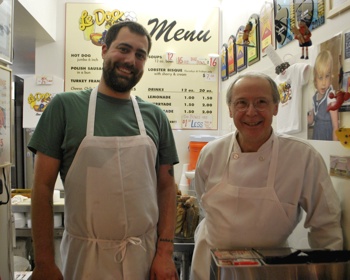Column: The Chronicle’s Last Chapter
I always start a novel by reading its last chapter – I like to know how things turn out.

A small slice of a large shelf of books about the history of Ann Arbor at the downtown Ann Arbor District Library. The AADL will be archiving the more than 10 million words that were published over the course of six years of The Ann Arbor Chronicle.
For those of you like me, who also flip to the end: This is the final word from The Chronicle.
We launched this publication six years ago with no clear ending in sight. It was a jumping-off-the-cliff moment, with the hope – but certainly no guarantee – that we’d be creating something special, even transformative. There were many times along the way when I doubted our choice to take that leap. Recall that 2008 and 2009 formed the nadir of the economic recession, and in hindsight I marvel that we were able to thrash out a livelihood.
I marvel because at that time, no one was clamoring for in-depth reports on meetings of the library board, the Ann Arbor Downtown Development Authority, the park advisory commission or any of the other public entities we began covering. We wrote detailed 15,000-word articles on city council meetings, in an era when traditional news media considered 500-word stories too long for the attention spans of its target demographic.
Over 10 million words later, I’m proud of what we’ve accomplished, and proud too that we’re bringing it to a close on our terms. Dave Askins wrote about that decision in his Aug. 7 column. I’d encourage you to read it, if you haven’t already.
Since that announcement, we’ve received a flow of well wishes, understanding and support – the generosity of spirit that has fueled us these past six years. Many readers also shared personal anecdotes about what The Chronicle has meant to them. That’s been meaningful for us, too, because this publication has been a very personal endeavor since its inception.
My two favorites are these: We learned that The Chronicle’s coverage of the Ann Arbor planning commission was used as flirting material with an urban planning grad student – and that couple is now married with a child. And the family of Peter Pollack – a landscape architect who died in 2010 – is including The Chronicle’s description of his legacy in a collection of materials they’ve gathered for his grandchildren, so that the next generation will learn about this remarkable man when they grow up. (We had tucked an obit for Peter into one of our regular city council reports.)
I cherish these kinds of connections that are now intertwined with The Chronicle’s own legacy. We set out to create an archive of community history, and The Chronicle itself is now a part of that history. [Full Story]







